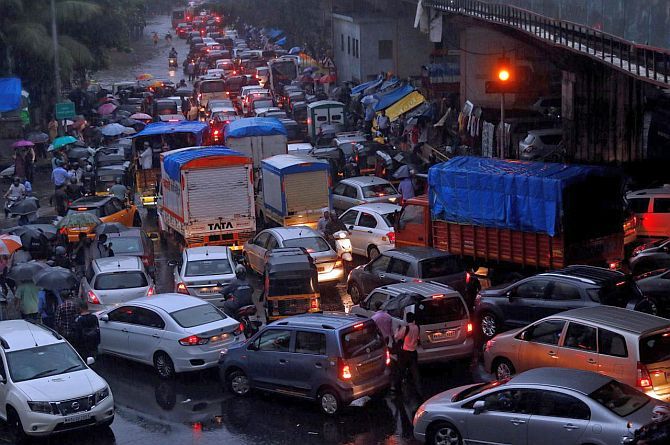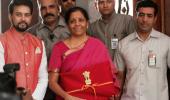Increasing the duties on auto parts and putting an additional cess on petrol and diesel could drive up costs of vehicles, specially where volumes are low and localisation is not viable.

The automobile industry on Friday rued the lack of policy initiatives in the Budget to help the sector wriggle out of a prolonged slowdown.
The industry, while welcoming government's push to promote electric vehicles through various policy measures, also sought similar kind of incentives for other green technologies.
Apex industry body Society of Indian Automobile Manufacturers (SIAM) said the sector has been going through a very difficult time and the industry was expecting some form of a stimulus package in the Budget in line with what had been done by the government during the previous two similar slowdowns.
"It is disappointing that the finance minister has not recognised the distress in the auto sector and not come out with any kind of support or stimulus," SIAM President Rajan Wadhera said in a statement.
In fact, increasing the duties on auto parts and putting an additional cess on petrol and diesel could drive up costs of vehicles, specially where volumes are low and localisation is not viable.
The overall cost of operations of transport could further aggravate the slowdown in the industry, he added.
Furthermore, the industry had expected that a voluntary scrappage policy would be announced which did not happen.
Also, there was no announcement of extension of the 200 per cent weighted deduction for research and development expenses, Wadhera said.
However, initiatives for improving liquidity in the market by capital infusion in banks should help the industry to some extent, he added.
Toyota Kirloskar Motor vice chairman and whole-time director Shekar Viswanathan, while appreciating initiatives to promote clean environment with special benefits to encourage electric vehicles (EV), said there are other forms of green mobility which also help achieve the same objective.
"The government should also align its taxation policies towards such green mobilities which promote reduction of fossil fuel and betterment of environment," he added.
Similarly, Mercedes-Benz India managing director and CEO Martin Schwenk said, "Though the budget has given a boost to green mobility, we wished for the inclusion of plug-in hybrids for duty exemption too, as that would have further given a push to the green mobility efforts."
He also lamented increase in customs duty on automotive parts saying it is not going to help create demand in the industry, which already is facing continued strong macro-economic headwinds, resulting in subdued consumer interest.
"The increase in custom duty coupled with increased input costs due to fuel price hike, could lead to a rise in the price of our model range," Schwenk said.
Mahindra Group chairman Anand Mahindra said in a tweet, "Instead of lowering GST on all cars, she (FM) aligned with the vision for mobility, and incentivised only EVs."
In fact, the budget is an accumulation of seemingly unspectacular moves that will nudge the economy onto a trajectory toward $ 5 trillion and an improved ease of living, he added.
Automobile dealers' body Federation of Automobile Dealers Associations (FADA) said it expected more from the Budget considering the state of the industry.
"Our budget expectations were high... We were expecting specific measures in the budget to revive growth in the auto industry and to that extent we are disappointed," FADA president Ashish Harsharaj Kale said.
Moreover, with an addition of cess on petrol and diesel leading to price hike by 1 rupee might also impact auto sales, especially in the price sensitive two-wheeler segment, he added.
Automotive Tyre Manufacturers' Association (ATMA) chairman K M Mammen said the tyre industry was keenly looking to correction in inverted duty either by increasing import duty on finished goods (tyres) or reducing it on natural rubber.
"Basic customs duty has been increased on some auto parts in the budget, but tyres have been deprived of the relief," he added.
Welcoming the Budget proposals to promote electric mobility, SIAM's Wadhera said, "We warmly welcome the various additional measures announced to promote EVs like reducing the GST to 5 per cent, exemption in customs duty on EV parts and specially the income tax deduction on the interest component paid for loans."
All these measures will certainly help in making EVs more affordable and attractive to the consumers, he added.
Similarly, automotive component industry body ACMA welcomed the measures announced in the Budget to improve liquidity in NBFCs.
Tata Motors, president, Electric Mobility Business and Corporate Strategy, Shailesh Chandra said the proposal to lower the GST rate for EVs to 5 per cent and reduction in duties of EV components would help in further narrowing down the cost of ownership gap against internal combustion engine (ICE) vehicles.
The proposal to lower GST rates on EVs from 12 per cent to 5 per cent is a positive sign and the company hopes to see it implemented at the earliest, Revolt Intellicorp Founder Rahul Sharma said.
Fortum India managing director Sanjay Aggarwal said he now expects a lot of action in the electric mobility, charging and storage space in line with the government's green vision, which is very encouraging for the industry.
According to Hero Electric managing director Naveen Munjal, the income tax reduction of up to Rs 1.5 lakh on the interest paid on EV loans is an extremely positive move which will encourage customers to make a switch from ICE vehicles to EVs.
While, Gemopai Electric Co-Founder Amit Raj Singh said the reduction in GST along with an additional IT deduction of Rs 1.5 lakh on interest paid on loans for EVs, will help break the entry and perception barriers for the price sensitive Indian customers.
UNO Minda chairman and managing director NK Minda said the Budget proposals would definitely provide an impetus to the EV manufacturing in India.
The measures announced in the Budget would help in faster deployment of EVs, stated JBM group executive director Nishant Arya.
Photograph: Shailesh Andrade/Reuters










